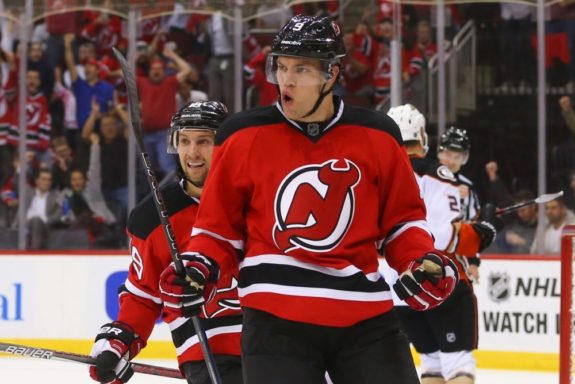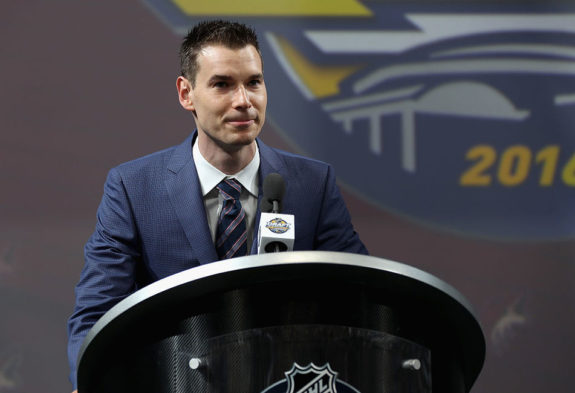The fact that the Arizona Coyotes were interested in trading for New Jersey Devils’ forward Taylor Hall has been the NHL’s worst-kept secret for the better part of the last two weeks.
Sportsnet’s Elliotte Friedman suggested that the Coyotes may be interested in acquiring Hall’s services in his ’31 Thoughts’ piece back on Dec. 4. However, with seemingly no further developments on that front, the rumors soon died down.

Things really started to heat up over the weekend, though, after the Coyotes were once again connected to Hall, and the player was made a healthy scratch in New Jersey’s road games at the Colorado Avalanche on Friday and at Arizona on Saturday.
The proceedings once again slowed down on Sunday, as, presumably, all parties involved stopped to watch Week 15 of the NFL regular season, but, on Monday, the deal finally became official.
Taylor Hall, the 2018 Hart Trophy winner as the National Hockey League’s most valuable player, is officially a member of the Arizona Coyotes.
What Did It Cost?
Although the Soul Stone cost Thanos everything in Avengers: Infinity War, Coyotes general manager John Chayka did not have to pay such a steep price for Hall.

Instead, the Coyotes parted ways with prospects Nick Merkley, Nate Schnarr, and Kevin Bahl, along with two draft picks – a top-three protected 2020 first-rounder, and another 2021 conditional pick, which, by default, is a third-rounder. If the Coyotes win a playoff round and re-sign Hall, the pick will elevate to a first-rounder. If one or the other happens, the pick will become a second-round selection. If neither happens, it stays a third-rounder.
Merkley Gets a Fresh Start
Nick Merkley entered Arizona’s system in 2015 after being selected at No. 30 overall in that summer’s draft. Following a 90-point draft year with the WHL’s Kelowna Rockets, Merkley looked like a future NHLer, but a string of injuries proceeded to derail the Calgary native’s career.

A shoulder injury cut short Merkley’s first NHL training camp in 2015, and a torn right ACL ended his WHL season in February 2016. Merkley recovered from his knee injury and turned pro in 2017-18, but more injuries soon would strike. Another shoulder injury in January 2018 caused the first-year Tucson Roadrunner to miss time, and another torn right ACL in March of that same year prematurely ended Merkley’s rookie season after 39 points in 38 AHL games.
Merkley, now 22, hasn’t shown the same scoring ability following his second ACL surgery, with just 50 points in his last 71 AHL contests. He likely missed his window to make Arizona’s NHL roster due to injury, but here’s hoping Merkley gets an opportunity with the Devils – he’s battled a ton of adversity throughout his young career so far, and you always have to root for kids like him.
No Room for Schnarr
Nate Schnarr was Arizona’s third-round selection in 2017, at No. 75 overall. Following two pedestrian campaigns with the OHL’s Guelph Storm, Schnarr broke out in 2018-19 in his age-19 season – he posted 102 points in 65 regular-season games before adding 19 more in 24 playoff contests as the Storm won the J. Ross Robertson Cup as Ontario Hockey League champions. Schnarr also posted two assists in the Memorial Cup, as Guelph was knocked out in the semifinal by the eventual champion Rouyn-Noranda Huskies.

The 20-year-old turned pro in 2019-20, and has posted a goal and eight assists through his first 22 career AHL games. Per Craig Custance of The Athletic, an amateur scout projects Schnarr as a future bottom-six, two-way center at the NHL level (from ‘Grading the Taylor Hall trade: ‘Their power play alone will be deadly’, The Athletic, 12/16/19).
The Coyotes appear set at the center position for the foreseeable future, with Christian Dvorak, Nick Schmaltz, and Clayton Keller signed through 2025, 2026, and 2028, respectively, so they were dealing from a position of organizational strength here.
Losing Bahl Could Hurt
The departure of Kevin Bahl, a 6-foot-7 defender, has the most potential to come back to haunt the franchise in the future. The 19-year-old has emerged as a solid all-around defenseman with the Ottawa 67’s, with 54 points in 96 OHL games since being drafted at No. 55 overall in 2018. He obviously brings good size to the table, and, with 20 points in 28 games this season, is starting to come into his own at the offensive end of the ice as well.

Bahl has the highest ceiling of any of the prospects the Coyotes parted ways with in this trade, but he ultimately isn’t Arizona’s No. 1 defense prospect. That instead is 2019 first-rounder Victor Soderstrom, who was rated as the best right-handed defenseman available in June’s draft.
In fact, the Coyotes managed to hold onto all four of their top prospects, as Barrett Hayton, Jan Jenik, and Ivan Prosvetov also remain in the system. Holding onto that quartet of youngsters is a big win for Arizona.
Along with Hall, the Devils also sent AHL forward Blake Speers to Arizona in the deal, as the clubs both had to stay under the 50-contract limit. Speers will likely report to Tucson – he has 28 points in 115 career AHL contests.
Where Does Hall Fit In?
Obviously, Hall immediately becomes Arizona’s first-line left-winger, and, as such, should receive big minutes on the Coyotes’ top line and first power-play unit.
From a possession perspective, Hall owns a Corsi For percentage (CF%) of 48.6 this season, which is higher than New Jersey’s team 47.3 CF%. The Devils are a bad team in 2019-20, but they possessed the puck more with Hall on the ice than they did when he was on the bench. And, despite playing on only one team which went on to qualify for the Stanley Cup playoffs, Hall is a positive possession player for his career through 592 games, with a 50.2 CF%.
From a traditional stats perspective, Hall has 155 points (56 goals, 99 assists) in his last 139 contests, good for 1.12 points per game (P/GP). The next-highest scoring Devils over the last three seasons are Nico Hischier (0.65 P/GP) and Kyle Palmieri (0.68 P/GP). When Hall won the Hart Trophy with 93 points in 2018, he did so with only one other 50-point scorer (Hischier) and two other 20-goal scorers (Hischier and Palmieri) on the roster.

It’s clear that Hall is capable of being “the guy” on a team. With the Coyotes, though, Hall will have many other skilled players alongside him, including Phil Kessel, Nick Schmaltz, Clayton Keller, Christian Dvorak, and Carl Soderberg, among others.
Hall’s linemates will be determined as the season progresses, but the thought of him playing 18-to-20 minutes a night alongside Schmaltz and Kessel likely has many Coyotes fans salivating. Hall is an elite possession-driving winger who is capable of carrying a team if need be.
And it sure looks like the Coyotes, who rank 24th in the NHL with 2.63 goals per game, need a player like Hall to generate offensive chances both at even-strength and on the power play.
Arizona already has a championship-caliber defense (and two No. 1 goaltenders to boot). If they can get above-average production from their offense over the final 47 games with Hall now in the fold, they could make some serious noise in the Stanley Cup playoffs.
The Pacific Division looks to be very winnable, and the Western Conference lacks a truly dominant club this year.
Could the Coyotes be that team in 2019-20?